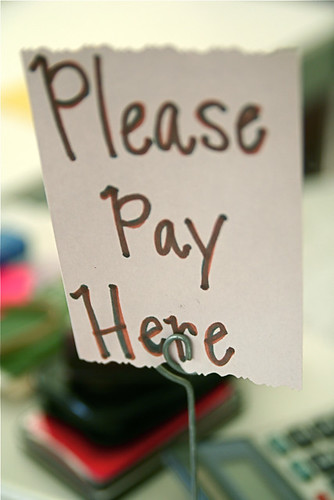Self-Employment: Tips on Getting Paid
In the excitement of starting your own business, it’s easy to overlook one common entrepreneurship problem -deadbeat customers and clients. Of course, large businesses can face the same issue, but the impact is much greater on small businesses and individuals. Some people, unfortunately, take advantage of smaller businesses and freelancers, assuming they lack the time and resources to chase overdue accounts. By following a few guidelines, you can ensure that you get paid all the money that you’re owed.
Ask for Money Upfront
Deposits and partial payments are common ways for businesses to protect themselves against late or non-paying customers. Most clients should be understanding of why you need such a policy, but some may be reluctant to pay for a service that hasn’t been performed. Research your industry to determine what’s standard before asking for money upfront. Another option is to use a third party service, such as Elance, to hold payment until the project is complete.
Set Firm Due Dates
Your due date should be clearly stated on all invoices so customers don’t make assumptions about when payment is expected. If you’re working on a large project, you may choose to get paid in increments as work is completed. If so, outline when payments are expected for each portion. You may also want to consult with a lawyer about creating a contract that states the details of the project, how much payment is expected and when payments are due.
Send a Friendly Reminder
Create a standard notice to send out to clients with overdue bills. You can find a good template online, and can send your notices via email or standard mail depending on how you generally interact with your customers. If you send out a notice the day the bill becomes overdue, you’ll send the message that you won’t tolerate late payments and hopefully prevent some of them simply by showing that you’re on top of things.
Make a Call
After sending reminders via mail or email, it’s time to step things up a notch. Give your customer a call and ask about the payment. Remain polite and don’t place blame. It’s possible the customer forgot or didn’t receive the reminders. You’ll likely get a sense of what’s going on by the explanation your customer offers. A common tactic of deadbeats is to say the check’s in the mail (when it isn’t) or to say they’ll send it out that day. Some people may be truthful about these assertions, but be wary when you hear them. State that you’ll be expecting the payment within a week (or a reasonable time for payment delivery) and that you’ll follow-up at that time if payment isn’t received (and be sure to follow-up!).
Set Up a Payment Plan
If a customer is having trouble paying, work with them to set up a payment plan. Some money is better than nothing, and you’re more likely to get responses from late customers if they know you’re willing to work with them on payments. This shouldn’t be a common scenario, but only used when you’ve tried the above measures and failed to obtain payment.
Keep a Blacklist
A customer blacklist can save you considerable time and money. If a customer is always late or simply doesn’t pay, it may be best to stop doing business with them. As an entrepreneur, you may be hesitant to turn away even difficult customers, but the time you spend trying to collect from deadbeat customers could be spent on more reliable clients.
Collections
Collections agencies get a bad rap, but one may be necessary if you have a large percentage of overdue accounts and have made repeated attempts to collect. Read more about When to Hire a Collections Agency from NRS.
Time is an especially valuable resource for the self-employed and it shouldn’t be spent chasing money that’s owed. Consistent accounts receivable guidelines can eliminate deadbeat customers or clients, allowing you to focus on attracting and retaining good customers.



